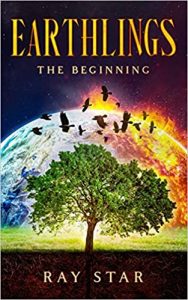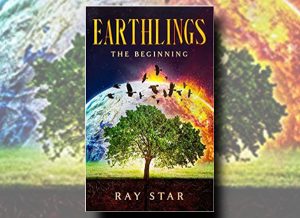EARTHLINGS by Ray Star (BOOK REVIEW)
Ray Star’s debut Earthlings is the opening volume in a planned trilogy examining the realities of speciesism. The theme is not so much cli-fi as eco-criticism, specifically around human’s treatment of animals and the books title reflects the inspiration drawn from the harrowing 2005 documentary film, of the same title. While anthropogenic climate change doesn’t feature as a driver of the plot, the book does share with many examples of cli-fi the idea of an abrupt and catastrophic change in the world’s circumstances that has brought about a new apocalyptic reality for humanity.
 In its key theme, Earthlings shares an approach with Malorie Blackman’s Noughts and Crosses series. Blackman re-imagines a world where lighter skinned Europeans were colonised, enslaved and exploited by darker skinned Africans and – in the present time of the stories – all the prejudices of our society are presented in reverse in a way that one hopes is thought provoking for its intended YA audience. Star, takes on a different imbalance – the human exploitation of animals for food, meat and entertainment – and inverts it by imagining a future world where the animals (specifically the very numerous herbivores) are farming the humans, through cruel tortuous methods and in unpleasantly confined spaces.
In its key theme, Earthlings shares an approach with Malorie Blackman’s Noughts and Crosses series. Blackman re-imagines a world where lighter skinned Europeans were colonised, enslaved and exploited by darker skinned Africans and – in the present time of the stories – all the prejudices of our society are presented in reverse in a way that one hopes is thought provoking for its intended YA audience. Star, takes on a different imbalance – the human exploitation of animals for food, meat and entertainment – and inverts it by imagining a future world where the animals (specifically the very numerous herbivores) are farming the humans, through cruel tortuous methods and in unpleasantly confined spaces.
The mechanism by which this transformation has been wrought is never described, beyond the enigmatic phrase “the changing” but it occurred within recent memory – one assumes near the birth of Peridot (Peri), our protagonist, who is about to turn 13 at the book’s opening. Peri lives on an island off the coast of England and has grown up in isolation with her mum Val, two older adults, Joe and Ann and a selection of animals. Peri appears to be a normal child, albeit one frustrated by the isolation of her home-schooled life without any company her own age, beyond what she can watch on videos of contemporary films. A prologue gives the reader a quick induction into the peculiarities of Star’s future world – a unnamed character pursued by a vicious swarm of talking chickens, led by a foul fowl named Alan. However, we then follow Peri slowly uncovering the fact that there is more strangeness to her existence than just an over-protective mother with her own self-sufficient island.
This is targeted as a YA book. In tone, Star’s writing reminds me of Derek Landy’s Skulduggery Pleasant series, although the talking animals – in their hatching plans and offering advice – do give Earthlings a bit of a 101 Dalmatians feel. The story is driven by two competing tensions. The first is the upturned world with humans (and some animals) striving for the freedom to live a harmonious life free from herbivore exploitation. The second is Peri coming to terms with her own magical nature as an elemental witch – like her mother, and her ancestors.
Star’s magic system has some resonances with N.K. Jemsin’s Broken Earth series in the elemental’s ability to draw magic power from their surroundings, but a power that can be difficult to control leading to localised destruction and the prejudiced hostility of people and animals. However, Peri’s tale is targeted at a younger audience than Essun’s, not so much wearing its heart on its sleeve, as flaunting it in its appeal to reader’s emotions and indignation. The reader might share Peri’s frustration at often being on the brink of receiving important information but finding circumstances delay or draw out the experience. However, there are some neat twists to the magic that make for a pleasing reveal when they (literally) announce themselves.
There are some nice subtleties in the worldbuilding. Buried in the descriptions of meals and travel food is a veritable vegan recipe book, for – while they live apart from the animal ruled mainland – Peri’s four human community do not themselves exploit animals in any way. Indeed the community very much includes their animals, though my sense of scale and scene did struggle when a pair of horses walked into the farm house’s kitchen, Peri and her mother mounted up, and then they rode out of the door. Having carried small children very gingerly on my shoulders through conventional doorways, I had to assume that the dimensions of Peri’s home were as unconventional as her magical nature.
The relationship between Peri and her mother Val is the one I found most interesting, since there are nuances to the conflict that are more subtle than the simple struggle for survival and dominance we see elsewhere in the story. Val’s protective love is intensely controlling and secretive in a way that embraces and extends the usual tension between a mother and a teenage daughter. Her keeping Peri isolated, shrouded in ignorance, and tethered by filial obedience can be understood in the context of her fears for Peri both from the world beyond the island and the power within her. Joe appears a kindly grandfather figure with a kind of infuriatingly Gandalfian refusal to part with the whole story. As the reader might be crying out “Just tell her!” Joe sheds enigmatic fragments of truth. To be fair, since Joe’s magic is in foretelling, he must know that saying too much about what will come to pass is the sure way of tangling the future so much that it never happens.
In the nature of the story there are plenty of talking animal characters who befriend or oppose our protagonist. Like the animals in Animal Farm, they have taken on the mannerisms and speech patterns of their former human masters. They include the sneering villains and the loyal sidekicks including several fiercely intelligent dogs (cats don’t make much of an appearance!) but – beyond that protective loyalty – even the dogs don’t get much depth of development in a story that feels more strongly driven by events rather than characters.
It rattles along at a good pace, with Peri separated from her only friend and playing catch-up across the animal dominated mainland. There are other forces at work though, and as the first in a trilogy, the book ends with a couple of cliff hangers – one of them quite literal – to tempt the reader into the next instalment.
This is a book with a great heart, a passion to interrogate some of the worst excesses of contemporary times through the lens of magical fantasy and a reversal of speciesism. Star does a good job in provoking thought about contemporary mistreatment of animals by depicting humans subjected to the same inhuman conditions under animal overlords. Yet within that remit, she still delivers an entertaining story about coming into power, peril and parental conflict as her protagonist grows up in a very differently imagined future.

